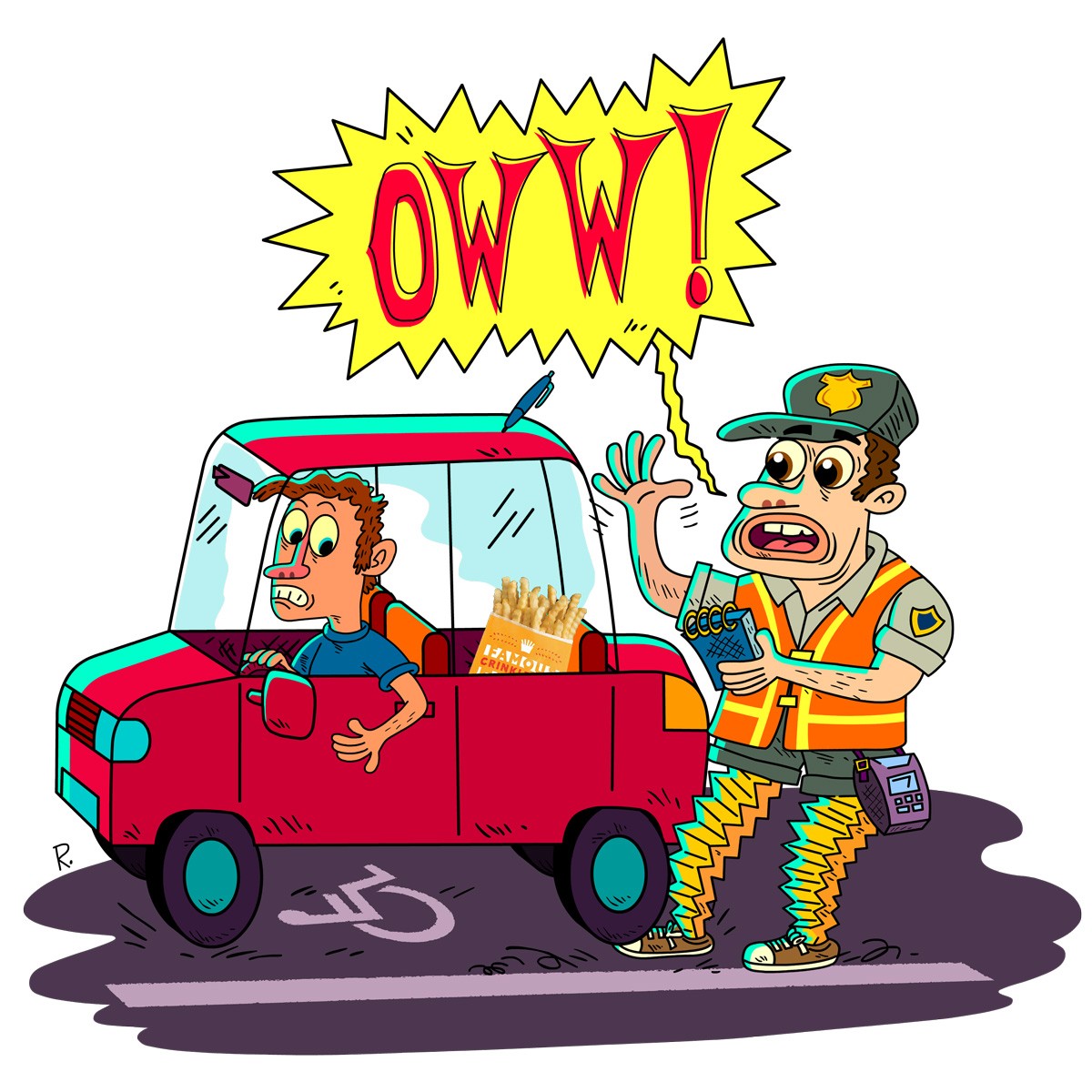
Ridiculously minor encounters with authorities can drag citizens into drawn-out disasters. That’s what happened to Cal State Fullerton (CSUF) student John Barrett on Sept. 21, 2011, when he briefly tried to occupy a parking space reserved for disabled drivers. Barrett, then a freshman, couldn’t have anticipated the act would launch a roller-coaster, five-and-a-half-year battle that concluded last month in the most unlikely of places: federal court.
An initial guess might label Barrett callous. Facts, however, prove otherwise. He’d driven three friends to Del Taco when he received a telephone call from his locked-out dormitory roommate. They returned to campus but found the parking lot full. Barrett pulled into an empty handicap space, activated his Lexus sedan’s flashing hazard lights, left the engine running, located nearby parking-enforcement officer Nolan Greenup, a fellow student, and explained his mission. After Greenup told him to vacate the spot, Barrett returned to his vehicle.
This is where the incident took several escalating twists. CSUF policy at the time gave parking officers discretion about whether to issue tickets in such cases, and Greenup opted to do so. He placed himself near the rear of the car as it backed out. Barrett stopped, honked his horn and asked him to move out of the way. After stepping to the right, the parking cop claimed he felt a “slight bump” over his left shoe. He called CSUF police, who further overdramatized the situation by summoning the Fullerton Police Department (FPD) to a “priority call.”
Two CSUF cops*, corporal Jose Rosales and sergeant Peter Dupree, heard an uninjured Greenup say, “I do not believe Barrett intentionally did it.” The officers then brainstormed, deciding to pursue charges of “assault with a deadly weapon.” They arrested a diabetic Barrett, who was transported to the Orange County Central Jail to be fingerprinted, photographed, DNA swabbed for government databases, given a permanent FBI criminal number and housed with assorted other arrestees. Whether from incompetence or wickedness, deputies traumatized him further by blocking his access to insulin medicine, which caused severe distress. Barrett paid a $2,000 bail bond to win release from custody the next day and spent $10,000 on a defense lawyer.
A police report asking the Orange County district attorney’s office (OCDA) to file assault charges failed to mention Greenup’s statement at the scene. But prosecutors must have been suspicious. They reduced the supposed crime to, oddly, “hit and run with property damage.” Good news finally happened seven months into the ordeal when OCDA dropped the weak case.
For decades, cop union-controlled politicians in both major political parties have crafted laws to cleverly sabotage citizens’ courthouse complaints of law-enforcement abuses, often through immunity shields. Rogue cops and police agencies routinely take advantage of their special status inside the Ronald Reagan Federal Courthouse in Santa Ana. That’s where Barrett’s claim seeking $2.88 million in actual and punitive damages eventually landed, in U.S. District Court Judge James V. Selna’s courtroom.
The gist of the lawsuit contended that Greenup secured false arrest by “staging” an accident; FPD conducted a sloppy investigation, aiming for trumped up charges; and that jail deputies abused their authority. It also noted FPD officers neither heard Greenup complain of pain nor saw any injury at the scene.
“Any layman of average intelligence would know that a mere ‘accident’ is not an ‘assault,'” Everett L. Skillman, Barrett’s Orange-based civil attorney, wrote in the lawsuit. “People do not go to jail merely for causing an accident. . . . The emotional distress [Barrett] suffered, and is suffering, is an invisible injury that was caused by the constitutional violations committed by each of the defendants.”

Meanwhile, then-California Attorney General Kamala Harris’ office asserted various immunity claims for the civil case defendants and tried to re-litigate the abandoned state charge by arguing officers could have reasonably assumed Barrett was guilty of a felony. “All that was required on the part of [Barrett] was the intent to back up his vehicle knowing that defendant Greenup was in the zone of danger,” Supervising Deputy Attorney General Richard F. Wolfe told Selna, a 2003 lifetime appointee by President George W. Bush. “It is not required that he intend to break the law [or] intend to use force against someone when he acted.”
Wolfe also asserted a future jury should be kept in the dark about the state court outcome. “Allowing Barrett to suggest he ‘won’ the criminal case is confusing and misleading,” he wrote in a brief. “Barrett did not ‘win’ his criminal case. It was simply dismissed following a plea bargain.”
Skillman considered the argument disingenuous. “The dismissal was not the result of a ‘plea bargain’ because Barrett never pled guilty or ‘nolo contendre’ and never changed his ‘not guilty’ plea,” he reminded Selna. “The May 21, 2012, dismissal represents the end point of criminal proceedings and tends to establish that none of the [OCDA] prosecutors—and there were several prosecuting attorneys that are documented as having been involved in [Barrett’s] case—ever believed that he was guilty of ‘assault with a deadly weapon’ pursuant to California Penal Code, which is what [civil case] defendants arrested Barrett for.”
In July 2015, Selna determined police had sufficient probable cause for the arrest, granted the AG’s motion for pretrial summary judgment and handed Barrett a $2,000 bill to reimburse the defendants’ legal costs. The Weekly recently featured another of the judge’s cases, in which a California Highway Patrol officer was sued for blocking restroom access to a female motorist suffering severe intestinal pain and diarrhea. (See “Federal Judge: Cops Have Power to Make You Crap In Your Pants,” Feb. 15.) Finding the cop hadn’t violated any constitutional right, he granted summary judgment in that matter, too.
Barrett appealed to the U.S. District Court of Appeals for the Ninth Circuit, on which a panel of two President Jimmy Carter appointees—Mary M. Schroeder and Harry Pregerson—and a Bill Clinton pick, Mary H. Murguia, presided. The losing plaintiff believed a jury should decide if his rights had been trampled. Without hearing oral arguments, the panel backed Selna on Feb. 9.
In their view, officers made a legitimate arrest because there had been a “fair probability” that Barrett “committed a crime” by intentionally reversing his car with Greenup “in the vicinity.” They also challenged Skillman’s contention that the lack of injury was an important component to his lawsuit, noting in alliance with the AG’s Wolfe, “This argument fails because ‘one may commit an assault without making actual physical contact with the victim . . . whether the victim in fact suffers any harm is immaterial.'”
Given that ruling, you have to wonder how many drivers in crowded grocery-store parking lots escape Barrett’s absurd plight every day, with shoppers “in the vicinity” as they back out.
[*Note: An earlier version of this article incorrectly identified the two university cops as members of the Fullerton Police Department.]

CNN-featured investigative reporter R. Scott Moxley has won Journalist of the Year honors at the Los Angeles Press Club; been named Distinguished Journalist of the Year by the LA Society of Professional Journalists; obtained one of the last exclusive prison interviews with Charles Manson disciple Susan Atkins; won inclusion in Jeffrey Toobin’s The Best American Crime Reporting for his coverage of a white supremacist’s senseless murder of a beloved Vietnamese refugee; launched multi-year probes that resulted in the FBI arrests and convictions of the top three ranking members of the Orange County Sheriff’s Department; and gained praise from New York Times Magazine writers for his “herculean job” exposing entrenched Southern California law enforcement corruption.

